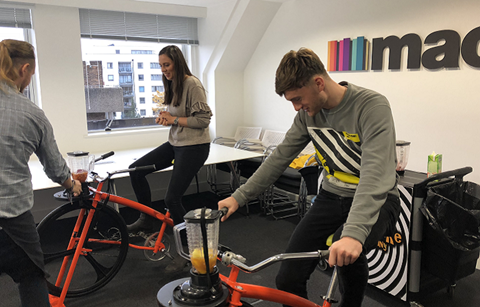
EXCLUSIVE: Construction and facilities management organisation Mace hosted a wellbeing week for its 6,300 worldwide employees in November 2018, to help launch its annual engagement and wellbeing survey, as well as to align with its five-year health and wellbeing plan.
Mace has employees operating in over 40 countries, with more than 300 UK-based construction projects.
Spearheaded by 153 global employee wellbeing ambassadors, the wellbeing week ran during the week of 5 November 2018, in 50 sites across the majority of Mace’s operating countries, although some locations hosted the wellbeing week at a different time, in order to accommodate business priorities. The wellbeing ambassadors were given the responsibility of organising the wellbeing week activities, structured around a 'five ways of wellbeing' theme.
Dr Judith Grant, director of health and wellbeing at Mace, said: “[We] really empowered [the wellbeing ambassadors] to come up with what works for them, because what works for us in London may be very different to what works for some of our teams in Dubai or Pakistan, and wellbeing will mean different things to different people. Using the 'five ways to wellbeing' was a nice structure that everyone could understand and then set up what they wanted to do individually.”
The five pillars involved in this theme are: give, take notice, be active, keep learning and connect. Based around these principles, the organisation recorded 350 different activities that were planned as part of the wellbeing week. Among others, these included volunteering opportunities, lunchtime walks, tea and talk sessions, attending art galleries, yoga classes, spinning sessions, high intensity interval training workouts, art classes and Spanish tutorials.
Employees were also encouraged to network with each other while participating in activities, and many staff engaged using #MaceWellbeingWeek on social media.
The wellbeing week corresponded with Mace's wider five-year health and wellbeing plan, which will be a focus for the business until 2022. One pillar of this strategy is around creating wellbeing opportunities and raising awareness of the available support that can help employees with their health and wellness. This is where the wellbeing week fits into Mace’s broader wellbeing roadmap. “It has to be part of a wider health and wellbeing strategy,” Grant explained. “Wellbeing week was one element of a far wider organisational strategy to improve health and wellbeing.”
The other pillars of Mace’s five-year plan include managing the health risks common in the construction industry, such as noise, dust and stress, becoming thought leaders and sharing best practice to champion health and wellness within the sector, developing healthy buildings to minimise health and wellbeing risks and looking at community wellbeing and sustainability, for example carbon emissions and sourcing resources responsibly.
Mace further used its wellbeing week to launch its wellbeing and engagement survey, which this year generated a 68% response rate. The 2017 edition of the survey was used to inform and underpin the organisation’s health and wellbeing plan, so the 2018 survey was designed to track changes and developments, as well as to generate leading indicators that demonstrate the wellbeing of the business.
The survey covered topics such as employee resilience, job satisfaction, engagement, and healthy behaviour habits and information; the latter category includes, for example, smoking, diet, hydration and exercise, sleep, psychological wellbeing and mental health, stress, working relationships, workloads and productivity.
The 2018 survey was communicated to employees using a multi-pronged approach, comprising messages on the intranet, webinars with wellbeing ambassadors, emails, and briefing sessions with the HR team, health, safety and wellbeing team and the sustainability team, who would cascade information back to the business. The survey was also championed by the organisation’s chief executive officer and board members.
The data from the 2018 survey is still being collated and will be fed back to both the group board and employees in February 2019.
Grant concluded: “We recognise the wellbeing week on its own is not a wellbeing strategy. As part of a well-put-together health and wellbeing plan, it can, [however], be a really effective way of engaging with the business and encouraging people to engage with the wider wellbeing agenda.”











